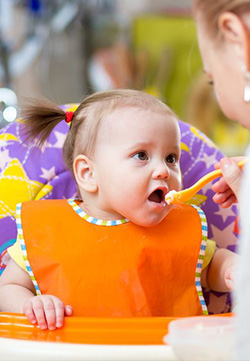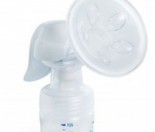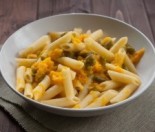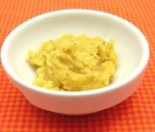Once it comes time to introduce solids to your baby’s diet, things can get a little confusing with all the well-meaning advice. We’ve asked nutritionist, mother of two and author of What Do I Feed My Baby, Leanne Cooper to clear up the confusion on starting solids with your baby.
When is the right time to start to start solids?
Babies and families are all quite different which is why the recommendations are now more flexible. It’s recommended that babies begin solids when they show appropriate signs of readiness between four and six months (26 weeks).
How do I know if my baby is ready for solids?
At around four months, many babies start to show interest in the food you eat. Remember even though babies at a much younger age might seem curious about what you put in their mouth, to a baby their mouth is their whole world – if it goes into even your mouth it must be interesting. So in itself, this isn’t necessarily a sign of readiness. Babies need to have good head control to start solids – have you ever tried to swallow food when your chin is sitting on your chest?
Some signs of readiness for solids
- Baby is between four and six months and shows physical signs of readiness
- Baby’s tongue extrusion reflex is reducing in readiness for swallowing over sucking
- Baby can hold his or her head up well
- Baby can sit unaided
- Baby shows an interest in food along with other signs
Starting too early isn’t recommended
Starting solids is a great stage and so many of us are keen to start baby on solids; however, don’t be tempted to start too early (before 16 weeks or before baby is physically ready). Early solids can be a challenge to baby’s immature immune and digestive systems; plus gagging or vomiting on food can put them off, to name just a few issues.
Delaying solids can impair nutrition
If you wait too long before starting your baby on solids, you do run the risk of compromising baby’s nutrition. At about six months of age the stores of iron that a baby is born with become depleted; that’s why iron-fortified baby cereals are often recommended as a first food. Starting solids is also important for motor development skills, for example chewing.
Tips on starting foods with your baby
- Texture has been shown to be one of the top priorities in working through solids. Initially foods should be a fine, runny puree and smooth in consistency. You will quickly begin working towards mashed food, then chopped, and finger foods around 9 months.
- Introduce foods one at a time so you will be able to pinpoint any reaction to the offending food.
- Once a variety of foods have been introduced successfully, make sure you vary them frequently to offer a wide array of nutrients. Variety at this early stage may also help you get through that fussy stage in the toddler years.
- Be persistent. Many studies show that it may take up to 10 or more opportunities to try a new food before baby accepts it.
Ideas for starting foods
Sweet potato is a great vegetable to start with as it’s tasty and has a low GI. Avocado (which is in fact a fruit) is also an excellent starter; its fat composition is similar to breast milk. From there just keep working your way through the vegetables, interspersing them with fruit; before too long you will be adding other food groups. Keep in mind also that babies are born with a love of sweet tastes, so watch out for an over reliance on sweet foods, variety is the key.
Iron-enriched infant cereal is one of the best sources of iron. However, a number have high GI ratings, and on their own many babies find these quite bland and a bit on the dull side. Making infant cereal your second or third choice can help with baby’s acceptance.
Fluid plus food
Babies’ kidneys are not as adept as ours at processing the waste products from food; hence per gram of food they need more fluid to process it. Even the smallest sips of clean water (juice is not recommended in infancy) from an age- appropriate sipper cup regularly throughout the day can go a long way to avoiding any problems such as constipation. Even if baby rejects water at first, keep offering it as often as you can during the day (babies don’t have great thirst reflexes) they will eventually take to it.







